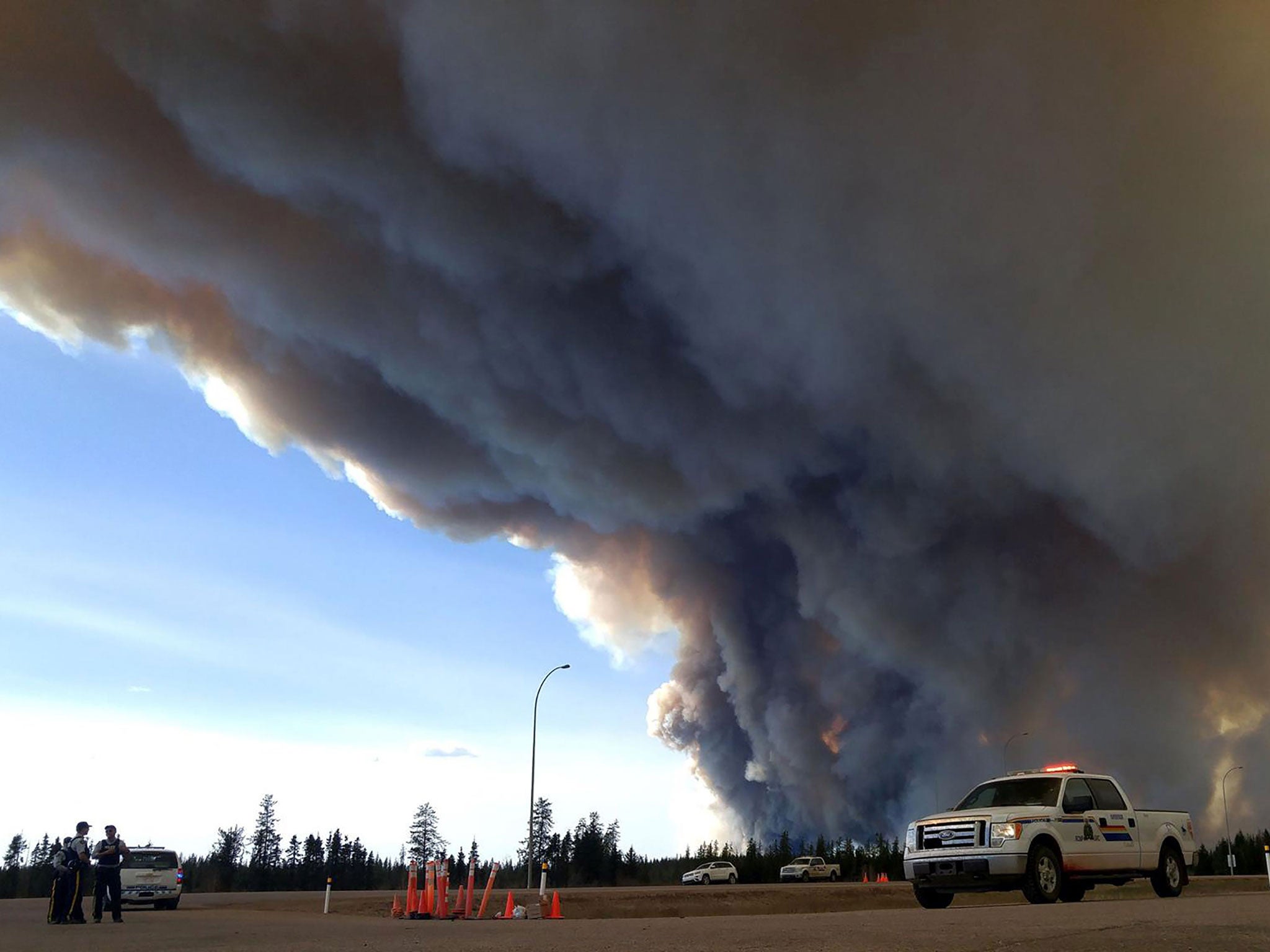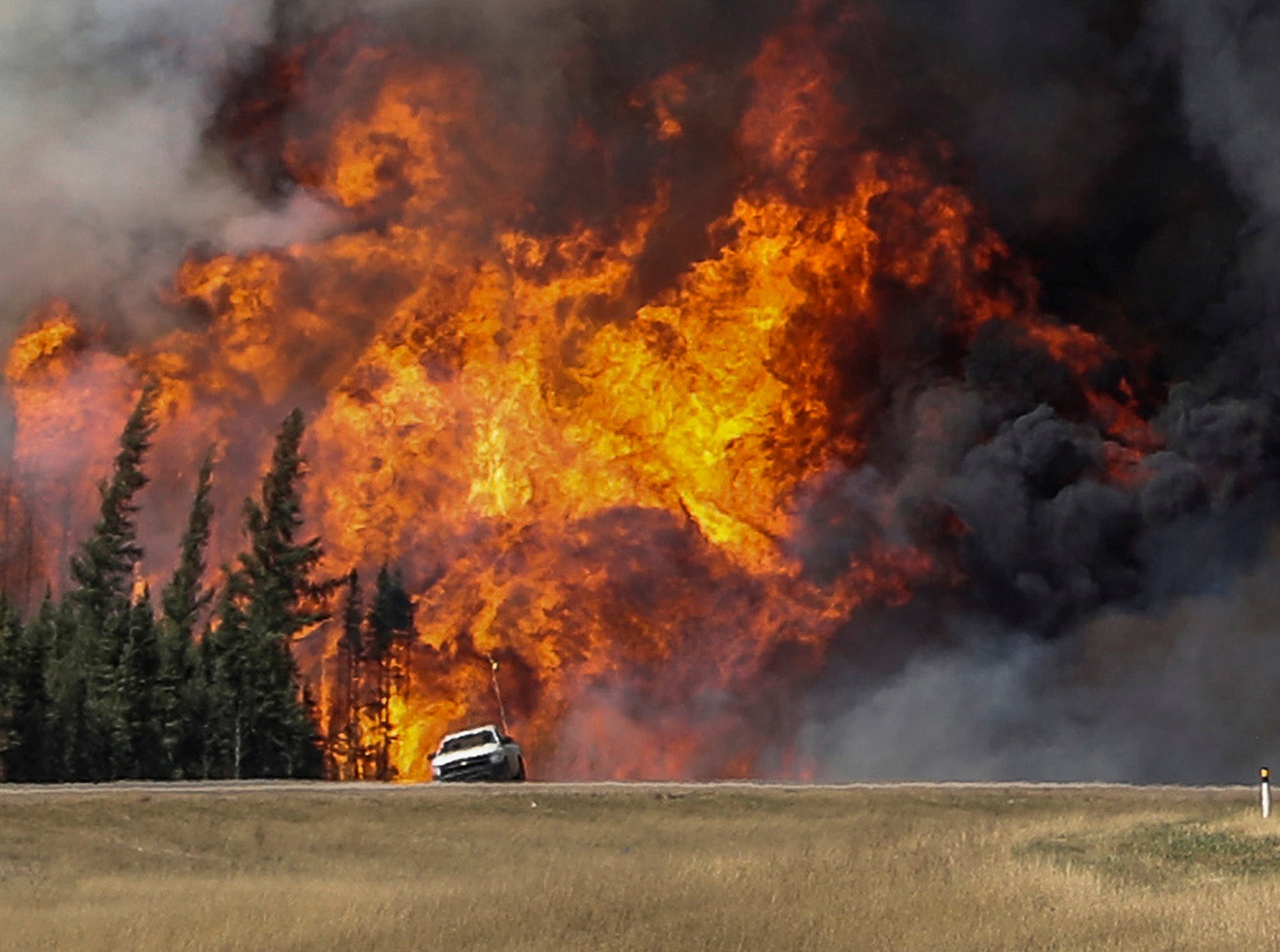Fort McMurray fire: Canadian officials strive to get 'death' grip on blaze
Weather improvements have aided firefighting efforts
Your support helps us to tell the story
From reproductive rights to climate change to Big Tech, The Independent is on the ground when the story is developing. Whether it's investigating the financials of Elon Musk's pro-Trump PAC or producing our latest documentary, 'The A Word', which shines a light on the American women fighting for reproductive rights, we know how important it is to parse out the facts from the messaging.
At such a critical moment in US history, we need reporters on the ground. Your donation allows us to keep sending journalists to speak to both sides of the story.
The Independent is trusted by Americans across the entire political spectrum. And unlike many other quality news outlets, we choose not to lock Americans out of our reporting and analysis with paywalls. We believe quality journalism should be available to everyone, paid for by those who can afford it.
Your support makes all the difference.Canadian officials are optimistic they are beginning to get on top of the country's most destructive wildfires in recent memory, as favorable weather helped firefighters and winds took the flames southeast, away from the town of Fort McMurray.
There was still no time line, however, for getting Fort McMurray's 88,000 inhabitants back into what remains of their town, or when energy companies would be able to restart operations at evacuated sites nearby. The wildfires have cut Canada's vast oil sands output in half.
"It definitely is a positive point for us, for sure," said Alberta fire official Chad Morrison in a news briefing, when asked if the fight to contain the flames had a reached a turning point.
"We're obviously very happy that we've held the fire better than expected," said Mr Morrison. "This is great firefighting weather, we can really get in here and get a handle on this fire, and really get a death grip on it."
The wildfire scorching through Canada's oil sands region in northeast Alberta since last Sunday night had been expected to double in size on Sunday, threatening the neighboring province of Saskatchewan.

But with the fire moving into its second week, light rains and cooler temperatures helped hold it back, giving officials hope that they could soon begin assessing the damage to Fort McMurray, close to where the fire started.
"As more and more fire has burned out around the city and the fuel around the city starts to disappear ... we are starting to move into that second phase of securing the site and assessing the site," Alberta Premier Rachel Notley told the same media briefing.
Officials said it was too early to put a time line on getting people back into the town safely.
The broader wildfire, moving southeast through wooded areas away from the town, would still take a long time to "clean up," Morrison cautioned. Officials previously warned that the fire could burn for months.
Alberta's government estimated on Sunday that the fire had consumed 161,000 hectares (395,000 acres). It did cover 620 square miles - larger than Hong Kong's 426 square miles - but authorities warned the fire would likely grow overnight.
Fort McMurray is the center of Canada's oil sands region. About half of the crude output from the sands, or 1 million barrels per day, has been taken offline, according to a Reuters estimate.
Oil prices jumped almost 2 percent in trading early on Monday, as Canada's fire contributed to tightening supply.

The inferno looks set to become the costliest natural disaster in Canada's history. One analyst estimated insurance losses could exceed C$9 billion ($7 billion).
Officials said on Sunday the fire had done minor damage at CNOOC unit Nexen's Long Lake facility, in the site's yard. It was the first reported damage to an energy industry asset since the fire began.
Morrison said air tankers, helicopters and bulldozers had kept the blaze from reaching a Suncor Energy Inc facility, which Suncor identified as its base oil sands mining site north of Fort McMurray, and a Syncrude facility.
Suncor said on Sunday it would allow employees to return to work as soon as it was safe to do so. "We are hopeful that this will be soon," the company said in a statement, adding it planned to use temporary camps for employees and was arranging for workers to commute from Calgary and Edmonton.
Syncrude said its oil sands project about 35 km (22 miles) north of Fort McMurray had shut down completely on Saturday morning, the first time in its 38-year history, because of smoke from the wildfire. "We are not currently under threat from the actual fire, it's smoke that's presenting health hazards," a spokesman said.
Notley is set to meet with energy executives on Tuesday to talk about the impact of the fire and how the province can help them resume operations.
Even though the fire has largely pushed through Fort McMurray, the town is still too dangerous to enter.
Nearly all of Fort McMurray's residents escaped the fire safely, although two people were killed in a car crash during the evacuation. The town's 160 firefighters worked nearly non-stop in the first days of the fire, even as some of them lost their own homes, said fire captain Nick Waddington.
Thousands of evacuees are camped out in nearby towns but stand little chance of returning soon, even if their homes are intact. The city's gas has been turned off, its power grid is damaged and the water is undrinkable.
Provincial officials said displaced people would be better off driving to cities such as Calgary, 655 km (410 miles) to the south, where health and social services were better.
"We are thinking about relocating in Edmonton for the time being. Maybe stay a year," said Kyle Mackay, 27, a mechanic for equipment trucking company Northern Diesel, who fled from Fort McMurray to Lac la Biche, about three hours' drive south, and is now staying with friends.
His girlfriend, Sarah Smith, who left separately, is pregnant and due to be induced into labour in Lac La Biche on Monday morning. "It's really stressful, but I know we'll get through it," said Mackay.
Some evacuees are keen for people to return to the place known as 'Fort Mac,' or 'Fort McMoney' for its well-paid oil jobs.
"I'm trying to convince people Fort McMurray is a good place to return and rebuild," said Curtis Phillips, who has worked in the media in the town, speaking at a "reception center" in Lac La Biche providing food, shelter and services for the displaced.
"People will return because of the high salaries and benefits," he said.
Officials said on Sunday that 34 wildfires were burning, with five out of control. There are more than 500 firefighters battling the blaze in and around Fort McMurray, with 15 helicopters and 14 air tankers.
Reuters

Join our commenting forum
Join thought-provoking conversations, follow other Independent readers and see their replies
Comments